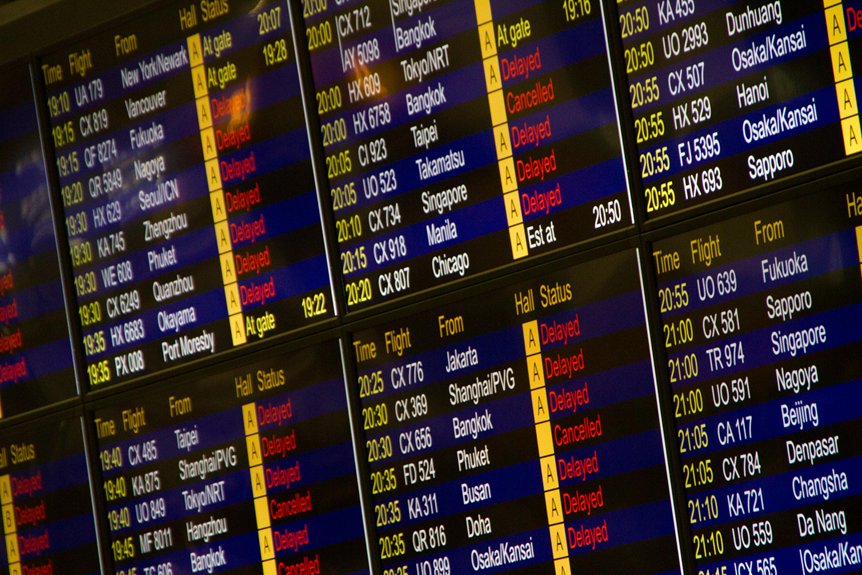Travel delays and cancellations can be frustrating, but knowing how to handle them can make a difference. You'll want to stay informed about your flight status and explore your rights regarding compensation. It's also wise to have a backup plan in place. By preparing in advance, you can minimize stress and navigate these disruptions more effectively. Let's explore some practical strategies that can keep you calm and in control during unexpected travel hiccups.
Stay Informed: Monitor Flight Status and Notifications
When you're traveling, staying informed about your flight status is crucial, especially if delays or cancellations occur. You don't want to arrive at the airport only to find out your flight's been pushed back or canceled altogether.
Use your airline's app or website to check real-time updates. Many airlines send push notifications straight to your phone, so make sure you opt in for those alerts.
If you're at the airport, look for the flight status boards or ask an airline representative for assistance. It's also wise to follow the airline's social media accounts for the latest news.
Know Your Rights: Understanding Compensation and Refunds
Have you ever wondered what your rights are when a flight gets delayed or canceled?
It's crucial to know that airlines often owe you compensation, especially for significant delays or cancellations caused by their operational issues.
Depending on your location, regulations like the EU261 in Europe or the DOT rules in the U.S. may apply, entitling you to monetary compensation or vouchers.
Always ask the airline about your refund options; if they can't get you to your destination within a reasonable time, you might be eligible for a full refund.
Keep documentation of your flight details and any communications with the airline.
Familiarizing yourself with these rights will empower you to advocate for fair treatment during frustrating travel disruptions.
Develop a Contingency Plan: Alternatives and Backup Options
While travel disruptions can be frustrating, having a solid contingency plan in place can make all the difference. Start by researching alternative routes and modes of transportation.
Check nearby airports or train stations for options if your flight gets canceled. Keep a list of local hotels handy in case you need to extend your stay unexpectedly.
Consider downloading travel apps that can provide real-time updates and alternative arrangements. It's also wise to have a backup plan for your accommodations and activities, in case your original plans fall through.
Lastly, ensure you have essential contact numbers saved, like your airline, travel agent, and any accommodations. Being prepared can help you navigate disruptions more smoothly and minimize stress.
Keep a Positive Attitude: Coping Strategies for Travel Stress
Travel stress can feel overwhelming, but maintaining a positive attitude can significantly ease the burden.
Start by reframing your thoughts; instead of focusing on what's gone wrong, think about the adventure that lies ahead. Use the extra time to read a book, listen to music, or catch up on a podcast.
Practice mindfulness techniques, like deep breathing or meditation, to help ground yourself in the moment. Remember, delays are often beyond your control, so accepting that can be liberating.
Surround yourself with positivity—talk to fellow travelers, share stories, and find humor in the situation.
Lastly, keep in mind that a positive outlook not only benefits you but can also uplift those around you, creating a more enjoyable atmosphere during travel hiccups.
Conclusion
In conclusion, handling travel delays and cancellations doesn't have to be overwhelming. By staying informed through your airline's app, knowing your rights regarding compensation, and having a solid contingency plan, you're better equipped to navigate any disruptions. Don't forget to keep a positive attitude—practicing mindfulness can help ease stress during these frustrating moments. With these strategies in place, you can turn a travel hiccup into a manageable experience. Safe travels!

